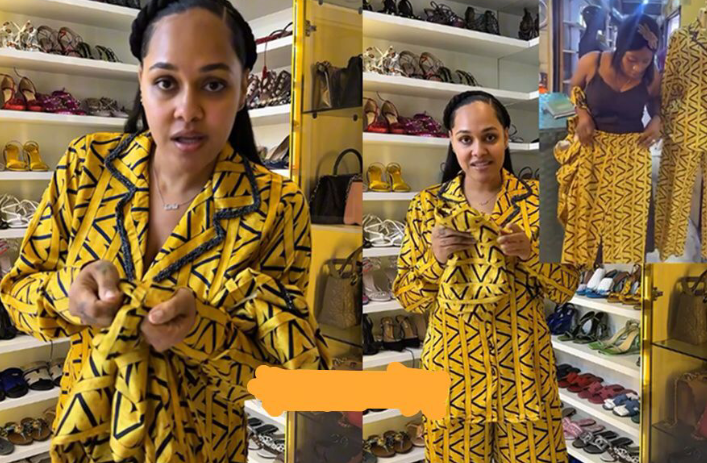
“The Audacity Is Wild”: Tania Omotayo Blasts Vendor for Copying Her Design and Selling It at Half the Price

Nigerian fashion entrepreneur and media personality, Tania Omotayo, has sparked a heated conversation on social media after publicly calling out an Instagram vendor who allegedly copied her exclusive Ziva Lagos custom print design and began selling it at half the price. Taking to her Instagram page, Tania expressed disbelief and frustration as she revealed that not only did the vendor replicate her brand’s unique design, but they also went as far as using her own picture to market the counterfeit product. The revelation immediately stirred outrage among fans, industry insiders, and fellow business owners, many of whom rallied in support of the fashion mogul while also lamenting the growing menace of intellectual property theft in Nigeria’s fashion industry.
According to Tania, she initially thought it was a joke when the issue was brought to her attention. Out of curiosity and disbelief, she decided to order the counterfeit piece herself just to be sure. To her shock, the vendor delivered the product, confirming that they had indeed stolen her design down to the custom print, the “ogo,” and even leveraged her personal image to advertise it. “I actually can’t believe this… An Instagram vendor not only copied our exclusive Ziva Lagos custom print (ogo and all!), but they also used MY image to sell it, at half the price. I had to order one myself because I thought it was a joke. Now I’m just sitting here confused. The audacity is wild!” she wrote.
The fashion industry, both in Nigeria and globally, has long battled with issues of design theft and counterfeit products. For many established brands, the problem is not just that replicas exist but that vendors shamelessly ride on the hard work, creativity, and marketing of original creators to make quick profits. In Tania’s case, what made the situation even more audacious and upsetting was the fact that her personal image—something deeply tied to her brand identity and reputation—was being used without her consent to push sales of a fake product. Fans were quick to point out that this crossed the line from design theft into blatant misrepresentation and exploitation.
The incident has triggered wider conversations around the lack of respect for intellectual property rights in Nigeria’s fashion space. While luxury fashion brands around the world often grapple with counterfeits, it is particularly rampant in Nigeria’s online marketplace where Instagram vendors, in particular, have gained a reputation for reproducing trending designs at cheaper rates. Consumers are lured in by affordability, often at the expense of originality and authenticity, while hardworking creatives like Tania Omotayo are left to deal with the erosion of their brand value and the financial losses that come with it.
Many supporters praised Tania for calling out the issue publicly, saying it was long overdue for big names in the fashion industry to speak up. Some argued that staying silent only emboldens such vendors, who thrive on the assumption that their unethical practices will go unnoticed or unchallenged. Others pointed out that the government and legal institutions in Nigeria have done very little to protect creators, especially in industries like fashion, art, and entertainment, where intellectual property rights are often overlooked or difficult to enforce.
For Tania, this was not just about money or competition but about principle. Ziva Lagos, her fashion line, has earned a reputation for its unique designs, vibrant prints, and premium quality. To see another vendor not only mimic that hard work but also devalue it by slashing the price in half is a direct attack on the brand’s identity. More so, using her image to legitimize the fake product could mislead unsuspecting buyers into thinking they were patronizing Ziva Lagos when in reality, they were purchasing a knockoff. This deception has far-reaching consequences, as it could damage the trust she has painstakingly built with her customers over the years.
The public outrage following her revelation also highlights a disturbing trend of normalized intellectual property theft on social media platforms. In many cases, these vendors are not held accountable, and buyers, knowingly or unknowingly, continue to support them. Some netizens admitted that while they sympathize with Tania, the economic reality of Nigeria pushes many buyers toward cheaper alternatives, regardless of whether they are authentic or not. But critics argue that this is a short-sighted view, as consistently patronizing counterfeit products stifles creativity, discourages innovation, and undermines the growth of indigenous brands.
Interestingly, Tania’s bold move to expose the vendor has reignited conversations about how creators can better protect their work. Legal experts weighed in, advising designers to register their intellectual property formally, even though enforcement in Nigeria can be sluggish. Others encouraged stronger collaborations within the fashion industry, urging creators to collectively call out unethical practices and push for stricter policies on platforms like Instagram that often serve as breeding grounds for such infringements.
Meanwhile, reactions on social media have been split between outrage and mockery. While many sympathized with Tania, others joked about how common it is for vendors to copy designs, suggesting that she shouldn’t be surprised. A few trolls went as far as defending the vendor, claiming that “inspiration” is part of fashion. But fans of Ziva Lagos quickly shut down such arguments, pointing out that inspiration is different from outright duplication, especially when the counterfeit includes stolen images of the original designer herself.
The phrase “the audacity is wild,” which Tania used in her post, has since gone viral, with many Nigerians employing it in memes and commentaries beyond the fashion industry. From politics to entertainment, people are using the phrase to describe situations that reflect shameless boldness or unethical behavior, proving once again how quickly social media can turn a personal outcry into a cultural trend.
For now, Tania Omotayo has not revealed whether she plans to take legal action against the vendor, but the story has already sent a strong message about the need for accountability in Nigeria’s booming but often chaotic online fashion marketplace. Many hope this incident will inspire other designers to speak out and also make buyers more conscious about the importance of supporting original brands rather than fueling the counterfeit market.
As the debate continues, one thing is clear: Tania’s frustration reflects a much larger issue faced by countless creators in Nigeria and beyond. Her public stand has not only shed light on the challenges of protecting originality in an age of instant duplication but has also sparked an important conversation about ethics, respect, and value in the creative industry. Whether this will lead to real change or simply fade as another trending topic remains to be seen, but for now, the audacity of this vendor’s actions has struck a chord with many, and the echo of her words—“the audacity is wild”—continues to resonate loudly across social media.


